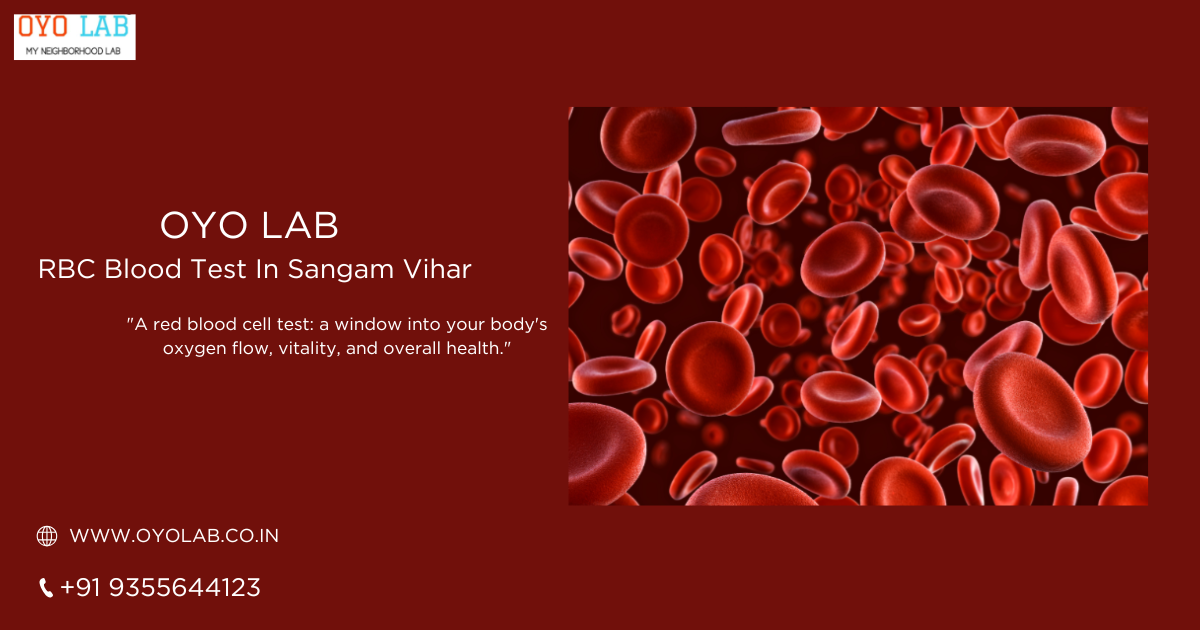
RBC Blood Test In Sangam Vihar
By Shilpa | March 02, 2025
What Is RBC Blood Test ?
An RBC (Red Blood Cell) Blood Test measures the number of red blood cells (erythrocytes) in your blood. Red blood cells play a crucial role in carrying oxygen from the lungs to the rest of the body and removing carbon dioxide.
Why Is an RBC Test Done?
Doctors use an RBC test to:
Detect anemia (low RBC count) or polycythemia (high RBC count).
Monitor chronic conditions like heart disease, kidney disease, or lung disorders.
Evaluate overall blood health and oxygen-carrying capacity.
Check for nutritional deficiencies (iron, vitamin B12, or folic acid).
Who Should Get an RBC Test?
People experiencing fatigue, weakness, dizziness, or shortness of breath.
Those with chronic illnesses like kidney disease or heart disease.
Patients with suspected anemia or dehydration.
Importance Of RBC Blood Test
A Red Blood Cell (RBC) Blood Test is essential for assessing overall health, detecting blood disorders, and monitoring chronic conditions. Since red blood cells carry oxygen throughout the body, their levels directly impact energy, organ function, and well-being.
1. Diagnoses Anemia (Low RBC Count)
Helps detect iron deficiency, vitamin B12 deficiency, and folic acid deficiency.
Identifies symptoms like fatigue, weakness, and dizziness caused by anemia.
2. Identifies Polycythemia (High RBC Count)
Detects excess red blood cells, which can thicken blood and increase the risk of blood clots, strokes, or heart attacks.
Helps diagnose conditions like polycythemia vera and lung disease.
3. Monitors Chronic Health Conditions
Helps track kidney disease, heart disease, and lung disorders, which can affect RBC levels.
Assists in adjusting treatments and medications for these conditions.
4. Evaluates Oxygen-Carrying Capacity
RBCs transport oxygen to organs and tissues, ensuring proper function.
Helps doctors assess how well your body is oxygenated and if intervention is needed.
5. Detects Dehydration or Overhydration
Low RBC levels may indicate overhydration, while high levels may suggest dehydration.
Ensures proper fluid balance for overall health.
6. Monitors Treatment Effectiveness
Helps evaluate the impact of treatments for conditions like anemia or polycythemia.
Allows doctors to adjust medications, diet, or supplements accordingly.
Benefits Of RBC Blood Test
An RBC (Red Blood Cell) Blood Test is a simple yet essential test that helps assess overall health by measuring the number of red blood cells in the blood. Since red blood cells carry oxygen, their levels directly impact energy, organ function, and disease detection.
1. Early Detection of Anemia
Identifies iron, vitamin B12, or folic acid deficiencies.
Helps diagnose anemia-related fatigue, weakness, and dizziness.
2. Detects Polycythemia (High RBC Count)
Identifies excessive RBC production, which may lead to blood clots, stroke, or heart disease.
Helps detect conditions like polycythemia vera and lung diseases.
3. Monitors Chronic Health Conditions
Assists in tracking kidney disease, heart disease, and lung disorders.
Helps doctors adjust treatments based on RBC levels.
4. Assesses Oxygen Transport Efficiency
Ensures organs receive enough oxygen for proper function.
Identifies low oxygen levels in conditions like lung disease or sleep apnea.
5. Helps Detect Dehydration or Overhydration
High RBC levels may indicate dehydration, while low levels suggest overhydration.
Ensures proper fluid balance and hydration status.
6. Evaluates Overall Health and Wellness
A routine RBC test provides valuable insights into blood health.
Helps monitor dietary deficiencies, infections, and blood disorders.
7. Monitors Effectiveness of Treatments
Helps track anemia treatment progress and adjusts medications if needed.
Evaluates responses to iron supplements, blood transfusions, or lifestyle changes.